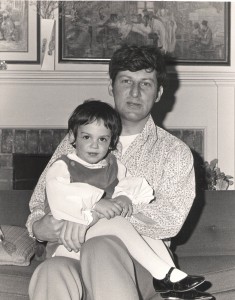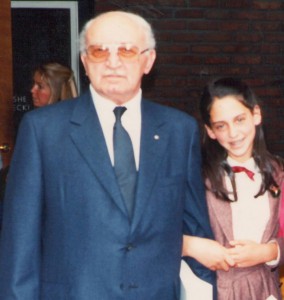Moshe Rynecki (1881-1943), my great-grandfather, was an artist. He wasn’t supposed to be an artist. His father, Abraham, a religious man, and a fairly successful business man (he operated a clothing factory specializing in hand sewn uniforms) did not approve of Moshe’s ambition to paint. Abraham, an Orthodox Jew, believed painting violated the Second Commandment, “You shall not make for yourself an idol, whether in the form of anything that is in heaven above, or that is on the earth beneath, or that is in the water under the earth.” And yet, according to my grandfather, his father was never punished for breaking the commandment. In fact, he was, according to my grandfather’s memoir, Surviving Hitler in Poland: One Jew’s Story, permitted to “draw figures on the walls, floors, using chalk or crude brushes and paint.” I never knew my great-grandfather. In 1943 he was deported from the Warsaw Ghetto by the Nazis to a concentration camp where he perished. I was not born until 1969, in California. Despite this distance of time, geography, and culture, his life has a powerful presence in my own life.
Moshe painted his whole life. He primarily painted scenes of the Jewish community – scholars studying the Talmud, Rabbis giving sermons, and congregations celebrating religious holidays. He had a flair for making the mundane seem compelling and a talent for conveying the essence of his subjects. Art historians and museum curators often refer to my great-grandfather as a “Jewish painter.” At times I am troubled by the insistence on referring to his religious background to describe his passion and vocation. Part of me wants him to be recognized completely separately from his religious upbringing. He did, after all, paint more than just scenes that could be considered strictly Jewish. And yet, given his place in history, describing him as a “Jewish painter” has meaning and purpose. While I think it is important to acknowledge the historical value of Moshe’s work, for me paintings have substantial personal value. The paintings provide more than a look at the past – a way of life destroyed by the Nazis – they are an actual, physical link to the past. The paintings are objects my great-grandfather actually touched. He bought the canvases, he chose the paints, thought about the scenes he wanted to record, and then he applied his vision to the canvas. The brush strokes on each of the canvases are an extension of his very being. Just having them around makes me feel closer to my great-grandfather, and bonds me to a past that would otherwise seem impossibly remote.
The responsibility for the second generation (the children of survivors) to bear witness is a rather odd one. The second generation didn’t actually experience the Holocaust. We only know its aftermath – its effects on our parents and, through our parents, its indirect effects on us. But as survivors grow older and pass away, there is no one left to tell the stories; to pass on the lessons learned. If we do not learn our family’s experiences and pass them along, these stories might be lost for forever.
Many children of the second generation seek to understand their relationship to their parents’ Holocaust experiences and what it is that they should, can, or ought to do with their family’s stories. Since children of survivors cannot bear witness since they did not experience the Holocaust, many struggle to find their voice within Holocaust discourse. For me, the most compelling voice is found in Art Spiegelman’s Maus books. Spiegelman does an incredible job of balancing his fathers’ Holocaust stories while articulating his own struggles to understand the Holocaust legacy. The way I read the Maus books, Spiegelman made it okay for children of survivors to talk about their own experiences without diminishing the importance of the stories of survival themselves. That insight was liberating for me because it meant I could talk about my own story and relationship to the Holocaust without diminishing my father’s and grandparents’ own stories of survival.
As a young girl I took my great-grandfather’s work for granted. I was not interested in hearing about my family’s history, or the persecution my family endured during the Holocaust. I had little interest in “the old country” or in learning about my family’s post-war difficulties. Later on, after my grandfather died, I regretted my indifference. I wished not only that I had listened; but that I had asked questions. Fortunately, when my grandfather passed away in 1992, my father found, in the trunk of his car, a collection of vignettes that we have since published as Surviving Hitler in Poland: One Jew’s Story. There is one passage from the book that I have read time and time again:
Some say it will never happen again. Well, it’s too easy. It did happen. They killed openly without fear. Where and how did they have that much hatred toward us? It could happen again. We cannot and will not forget. We will carry it, like the Bible, forever. There are hundreds of books on the subject. Nevertheless, I am a Jew and I write. I’ll do it till the end of my days. If only for my granddaughter, Elizabeth, to know the truth, and not to be afraid of it. It’s funny how were are not afraid to tell the truth.
As I get older, I continue to think not only of ways to share my family’s history and my great-grandfather’s paintings with others, but also about how to effectively pass it on to my children. While it is important for my children to know their history, I do not want them to dwell on it in a way that is unhealthy. When my sons were little I introduced little tidbits about Moshe. I made sure they knew that their great-great-grandfather was an artist. Now that they are eight and nine I have started to expose them to their family history – they know their grandpa was born in Poland and they know that some of the art that hangs in our home was painted by their great-great grandfather. Someday, perhaps, they will come to understand the history behind the paintings. My grandfather was right: it is important not to be afraid of the truth.


Speak Your Mind
You must be logged in to post a comment.